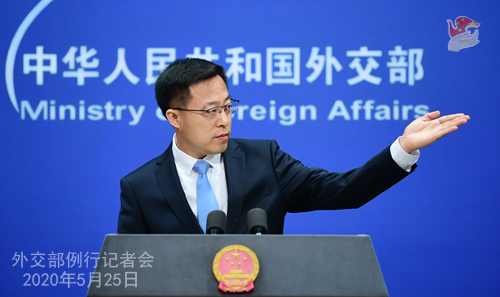
NHK: US White House National Security Advisor Robert O'Brien said to the press that the US government will likely impose sanctions on China if Beijing implements national security law related to Hong Kong. Do you have any comment?
Zhao Lijian: China is firmly opposed to the noises made by certain US politicians on the Hong Kong-related agenda of China's National People's Congress and has lodged solemn representations with the US side. Recently, the NPC, the Hong Kong and Macao Affairs Office of the State Council, the Liaison Office of the Central People's Government in the Hong Kong Special Administrative Region and the Hong Kong SAR government have all made explanations or responses. Yesterday, State Councilor Wang Yi also made a response when meeting the press during the Two Sessions. China's attitude and position have been made very clear. I wish to stress three points here:
First, no state will allow any activities that endanger its national security on its own territory. The Central Government is responsible for upholding national security in China, as is the case in any other country. The US itself has enacted dozens of laws on national security in an effort to build an impregnable fortress of its own national security. However, it has interfered in China's national security legislation and even attempted to drill a hole in China's national security network. Such double standards fully exposed the sinister intentions of some people in the US.
Second, the NPC decision targets a very small number of people who are splitting the country, subverting state power, organizing and carrying out terrorist activities, and foreign and external forces that are interfering in the affairs of the HKSAR. It will protect the law-abiding Hong Kong citizens, who are the overwhelming majority, guarantee the legitimate rights and interests of Hong Kong residents and foreign institutions and personnel in Hong Kong. It has no impact on Hong Kong's high degree of autonomy and the rights and freedoms of Hong Kong residents, and will improve Hong Kong's legal system and bring more stability, stronger rule of law and a better business environment to Hong Kong. It will be more conducive to Hong Kong's long-term stability and tranquility, which is most representative of the public opinion of the society in Hong Kong.
Third, the legal basis for the Chinese government's administration of Hong Kong is China's Constitution and the Basic Law, not the Sino-British Joint Declaration. Then again, what on earth does the declaration have to do with the US? With Hong Kong's return to China in 1997, the UK's rights and obligations stipulated in the Sino-British Joint Declaration were all completed. The US side has no legal basis or right to invoke the Joint Statement to make irresponsible remarks on Hong Kong affairs.
To sum up, I want to stress that Hong Kong is China's Hong Kong and the Hong Kong affairs are purely China's internal affairs. What legislation the HKSAR introduces and how and when it enacts the legislation is entirely within the scope of China's sovereignty. The US has no right to criticize or interfere. If the US is bent on harming China's interests, China will have to take all necessary measures to fight back.
